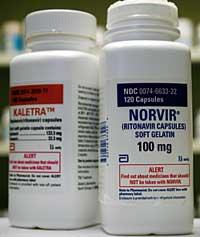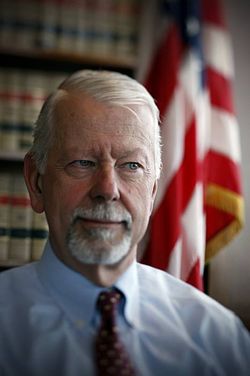 Yesterday, we reported on an antitrust case that took an odd turn. The case may not initially strike us as the stuff of social justice: two multibillion dollar companies fighting over potentially hundreds of millions of dollars in revenue while paying multimillion dollar law firms millions of dollars to do it. But in the blink of an eye, the lawyers went from talking about "unfair competition" to talking about "antigay discrimination."
Yesterday, we reported on an antitrust case that took an odd turn. The case may not initially strike us as the stuff of social justice: two multibillion dollar companies fighting over potentially hundreds of millions of dollars in revenue while paying multimillion dollar law firms millions of dollars to do it. But in the blink of an eye, the lawyers went from talking about "unfair competition" to talking about "antigay discrimination."
The case revolves around the price of an HIV drug and whether one company's decision to quadruple the drug's price violates unfair competition laws. At jury selection time, one of the attorneys used his right to exclude certain members from the jury pool to, ostensibly, exclude a gay person. We don't know for sure that this is what happened; these are allegations and proof is always hard to come by in these circumstances. But if the allegations are true, the act is troubling, at best: the lawyer was suggesting that a gay person cannot be impartial in a case involving an AIDS drug.
The case now asks: Can a person be excluded from a jury simply because of his or her sexual orientation? The answer's importance extends beyond the narrow confines of the jury room. It reminds me of the Prop 8 proponents' distasteful motion to vacate Judge Vaughn Walker's decision declaring Prop 8 unconstitutional because he is gay and was at the time of the case in a long term same-sex relationship.
It speaks to the concept of identity in law and the status of gay persons in modern American society. It also shows what we won — and what we didn't — in the Supreme Court's recent marriage equality cases.
AFTER THE JUMP, I explain what happened in the antitrust case and relate it back to major legal questions in LGBT law.
CONTINUED, AFTER THE JUMP…
 Yesterday, we reported on an antitrust case that took an odd turn. The case may not initially strike us as the stuff of social justice: two multibillion dollar companies fighting over potentially hundreds of millions of dollars in revenue while paying multimillion dollar law firms millions of dollars to do it. But in the blink of an eye, the lawyers went from talking about "unfair competition" to talking about "antigay discrimination."
Yesterday, we reported on an antitrust case that took an odd turn. The case may not initially strike us as the stuff of social justice: two multibillion dollar companies fighting over potentially hundreds of millions of dollars in revenue while paying multimillion dollar law firms millions of dollars to do it. But in the blink of an eye, the lawyers went from talking about "unfair competition" to talking about "antigay discrimination."
The case revolves around the price of an HIV drug and whether one company's decision to quadruple the drug's price violates unfair competition laws. At jury selection time, one of the attorneys used his right to exclude certain members from the jury pool to, ostensibly, exclude a gay person. We don't know for sure that this is what happened; these are allegations and proof is always hard to come by in these circumstances. But if the allegations are true, the act is troubling, at best: the lawyer was suggesting that a gay person cannot be impartial in a case involving an AIDS drug.
The case now asks: Can a person be excluded from a jury simply because of his or her sexual orientation? The answer's importance extends beyond the narrow confines of the jury room. It reminds me of the Prop 8 proponents' distasteful motion to vacate Judge Vaughn Walker's decision declaring Prop 8 unconstitutional because he is gay and was at the time of the case in a long term same-sex relationship.
It speaks to the concept of identity in law and the status of gay persons in modern American society. It also shows what we won — and what we didn't — in the Supreme Court's recent marriage equality cases.
AFTER THE JUMP, I explain what happened in the antitrust case and relate it back to major legal questions in LGBT law.
CONTINUED, AFTER THE JUMP…
Here's what happened: Abbott Laboratories makes an HIV drug called Norvir, which is widely used as a component in a cocktail of HIV drugs. It boosts the other drugs' effectiveness, so we call Norvir a "protease inhibitor booster". It's still effective, but it has side effects, sometimes significant ones. Today, Norvir has a lot of competition. Gilead Sciences, for example, offers the remarkable drug known as Truvada, which is the first drug approved by the FDA for preventing HIV from ever taking hold in the body. Norvir becomes less necessary when drugs start doing that.
Perhaps because its sales were falling or perhaps to recoup a significant research and development investment in Norvir, Abbott Labs dramatically increased the price of its drug. This had several effects: It bumped up their revenues, no doubt; it angered the HIV-positive community and its allies; it increased costs for other companies that used Norvir in its recommended cocktail of HIV/AIDS drugs.
The last effect was the straw that broke GlaxoSmithKline's back. Glaxo, one of Abbott's competitors, objected to the price increase and accused Abbott of violating antitrust laws. Glaxo's evidence of unfair competition was that Abbott increased Norvir's price, preventing other companies from offering their cocktail at a competitive price, while keeping Abbott's own cocktail that contained Norvir (Kaletra) at a steady, low price. Kaletra, then, under-priced every Norvir-containing cocktail. Sneaky, effective, maybe illegal.
 The antirust and unfair competition laws are not my primary concern here. So let's skip ahead to jury selection in Glaxo v. Abbott, where Abbott attorneys decided to use one of their "peremptory challenges" to toss a gay man from the jury pool. A "peremptory challenge" is a tool lawyers use to exclude certain ostensibly biased people from juries without having to explain themselves. But there are certain things we can't do with peremptory challenges–namely, exclude jurors based solely on their race or gender.
The antirust and unfair competition laws are not my primary concern here. So let's skip ahead to jury selection in Glaxo v. Abbott, where Abbott attorneys decided to use one of their "peremptory challenges" to toss a gay man from the jury pool. A "peremptory challenge" is a tool lawyers use to exclude certain ostensibly biased people from juries without having to explain themselves. But there are certain things we can't do with peremptory challenges–namely, exclude jurors based solely on their race or gender.
The question raised by Glaxo v. Abbott, then, is this: Is sexual orientation going to be given the same treatment as race and gender when it comes to jury selection and peremptory challenges?
There's an obvious answer: Yes. Excluding someone from a jury simply because he or she is gay is just as silly and discriminatory as excluding someone from a jury simply because he or she is black, Jewish, or short. But what is legal and what is just is not always synonymous.
Did Windsor answer the question for us? Some, including Glaxo, argue that Windsor's rejection of discrimination against legally married gay couples means that the Constitution does not countenance discrimination on the basis of sexual orientation. After all, the only thing that distinguished Edie Windsor from millions of other married woman was that Edie was married to a woman, not a man.
But it is not at all clear that this is a winning argument. We should be familiar with at least one important context in which race and gender, on the one hand, and sexual orientation, on the other, are treated differently: levels of scrutiny.
During our many discussions about the legal issues at play in the DOMA cases and in the Prop 8 case, we talked about the issue of scrutiny several times. Scrutiny levels are like hurdles on a track: the higher the hurdle, the fewer runners make it over. Similarly, the higher the level of scrutiny, the fewer laws pass constitutional muster. President Obama, in refusing to defend DOMA, argued that discrimination on the basis of sexual orientation deserves "heightened scrutiny" as opposed to the lowest "rational basis review" and DOMA failed under that higher standard. Several lower courts, from California to New York, agreed with President Obama and declared DOMA unconstitutional under heightened scrutiny. They said that discrimination on the basis of sexual orientation deserved special judicial attention because it violates deeply held constitutional principles of equality and raises suspicions of evil intent.
But the Supreme Court's Windsor decision did not endorse heightened scrutiny for sexual orientation discrimination. It kept the level of scrutiny somewhat lower–rational basis plus–but left it lower than that for gender (heightened scrutiny) and race (strict scrutiny, i.e., the highest level possible). Therefore, it is not clear that Windsor forecloses the possibility that sexual orientation can be treated differently than race and gender in other areas of law.
 This shouldn't be the end of the debate. Abbott Labs's attempt to exclude a juror simply based on that juror's sexual orientation is based on the odious and discriminatory presumption that gay people cannot be impartial when it comes to a case about AIDS. This smacks of stereotyping, discrimination on the basis of status, and over simplification. It also reminds me of the attempts to undercut Judge Vaughn Walker's Prop 8 decision simply because he is gay and was in a long term relationship when he presided over the Prop 8 trial.
This shouldn't be the end of the debate. Abbott Labs's attempt to exclude a juror simply based on that juror's sexual orientation is based on the odious and discriminatory presumption that gay people cannot be impartial when it comes to a case about AIDS. This smacks of stereotyping, discrimination on the basis of status, and over simplification. It also reminds me of the attempts to undercut Judge Vaughn Walker's Prop 8 decision simply because he is gay and was in a long term relationship when he presided over the Prop 8 trial.
As I argued at the time, the motion was offensive because it applied to all judges: The notion that judges cannot divorce their personal views from the legal matters before them is offensive, to lawyers and judges and our entire system of justice.
But the Prop 8 Proponents' argument and, by extension, Abbott Labs's, is worse. Their argument is not about women or African-Americans or Jews or former prosecutors or any other group that could be prejudiced. Their argument is about gays, a group uniquely vulnerable to insidious stereotypes in common discourse as promiscuous, weak, and sex-crazed. No one called Jews money-hungry during the Bernie Madoff scandal, yet mainstream conservatives took to FOX, CNN and MSNBC during the debate to repeal "Don't Ask, Don't Tell" to warn of unit discord, deaths, and orgies under the presumption that gay men could not keep their hands off other men. And during every marriage equality debate, gays are the targets of vitriol about disease, selfishness, and perversion. Such patently offensive comments were taken as legitimate arguments despite being as illegitimate as other gross stereotypes.
We saw those stereotypes in the Prop 8 motion to vacate and in the Abbott Labs peremptory challenge. The motion is based on nothing more than the stereotype that gay men are consumed by their selfish desires, incapable of being professional, and incapable of reason.
***
Follow me on Twitter: @ariezrawaldman
Ari Ezra Waldman is the Associate Director of the Institute for Information Law and Policy and a professor at New York Law School and is concurrently getting his PhD at Columbia University in New York City. He is a 2002 graduate of Harvard College and a 2005 graduate of Harvard Law School. Ari writes weekly posts on law and various LGBT issues.



